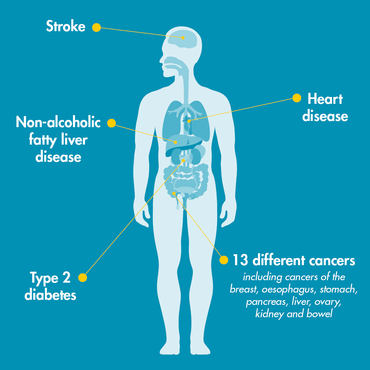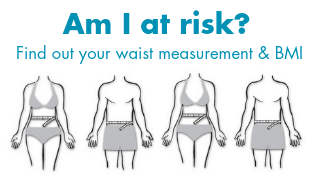
For a long time, fat was simply seen as the body's way of storing extra energy. We now know that fat is stored throughout the body and that it produces chemicals and hormones which can be harmful to the body.
It's what's inside that counts.
What is toxic fat?
Scientists used to think that fat tissue was just our body’s way of storing extra energy that we didn’t need. It was assumed that fat was just stored under the skin and didn’t really do much. Now we know that body fat is also stored deep inside our bodies, including on our organs. This is called visceral fat.
We also know that body fat doesn’t just sit there. Fat tissue produces chemicals and hormones which travel around our bodies. Visceral fat produces more of these chemicals than the fat under our skin. These chemicals can be damaging to our body. That’s why we call it toxic fat.
What’s the issue with carrying extra weight?
Carrying extra weight increases our risk of developing:
- Type 2 diabetes
- Heart disease
- Certain cancers (including cancers of the oesophagus, pancreas, bowel and breast)
- Non-alcoholic fatty liver disease
It also increases the chance of developing high blood pressure, gall bladder disease, gout, impaired fertility, lower back pain, osteoarthritis and many other health problems.
We know that our risk of these diseases depends on a lot of things, including how much extra weight we’re carrying, and where that fat is stored. Storing fat around your middle is a good sign that there is more visceral fat (which releases more chemicals and is more harmful). So how do we get rid of visceral fat? The same way we get rid of other fat - losing weight generally reduces visceral fat.
Am I at risk?
You can start to find out if you’re carrying extra weight by measuring your body mass index (BMI) or your waist measurement. Waist measurement is actually a better test of whether you’re at risk of toxic fat related disease. That’s because your waist measurement is a good gauge of how much fat is on your organs (that toxic visceral fat). BMI is a pretty good measure too though. You can read more about BMI here.
This doesn’t mean that everyone who is carrying extra weight is unhealthy, or that everyone who is thin is healthy. Eating well and being physically active will improve your health, regardless of your weight or shape.
Doctors use BMI and waist plus other measurements like blood pressure and blood cholesterol to get a more detailed picture of someone’s health.
Obesity increases the risk of disease

What's next?
Learn about chronic diseases and the link between overweight and obesity.
What about being underweight?
Not having enough body fat also carries health risks. Just like carrying extra weight, the risk increases as a person moves further from a healthy weight.
While too much fat is harmful, we all need some fat for good health. It provides us with cushioning and insulation from the cold. The body also needs fat to make body cells and hormones. Fat is a store for some vitamins and minerals and is vital for your nerves to work properly.
People who are underweight should talk to their doctor or other health professional for advice.
If you're concerned about a loved one who is underweight, or for more information about eating disorders and where to seek help, please visit www.nedc.com.au.
